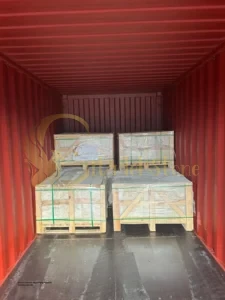This guide provides the practical framework you need to evaluate both options objectively, calculate true landed costs, manage risks, and make informed decisions that align with your project requirements and values.
Quick Comparison Snapshot
| Factor | Caribbean-Sourced Stone | Mainland Imports |
|---|---|---|
| Material Cost | $8-20/sq ft (illustrative) | $6-18/sq ft (illustrative) |
| Lead Time | 1-4 weeks (illustrative) | 8-14+ weeks (illustrative) |
| Freight & Handling | Local delivery $0.50-2/sq ft | Container freight $3-8/sq ft |
| Variety/Selection | Limited to local geology | Extensive global options |
| Salt-Air Performance | Often excellent (tested locally) | Variable (require verification) |
| Embodied Carbon | Lower transport emissions | Higher transport footprint |
| Economic Impact | Supports local jobs/economy | Minimal local benefit |
| Risk Level | Weather/capacity constraints | Customs, port delays, damage |
| Best Use Cases | Fast-track, sustainable projects | Specialty finishes, large volumes |
Cost Breakdown: Material vs. Total Delivered Cost
Typical Material Price Ranges
Local stone Caribbean pricing typically ranges from $8-20 per square foot (illustrative) depending on stone type, finish, and quarry capacity. Popular Caribbean limestone averages $10-15 per square foot, while specialty stones like local coral stone may reach $18-20 per square foot.
Mainland imports show material costs of $6-18 per square foot (illustrative) before freight. However, delivered costs often exceed local alternatives once transportation, handling, and customs fees are included.
Premium finishes add 20-40% to base material costs regardless of source. Bush-hammered, flamed, or antiqued surfaces require additional processing that increases both time and cost.
Freight, Duties, Handling and Local Delivery
Stone logistics Caribbean involve multiple cost components beyond material prices. Local deliveries typically cost $0.50-2.00 per square foot depending on island size and access conditions.
Import freight charges include:
- Container shipping: $2,000-6,000 per 20-foot container (illustrative)
- Port handling: $200-500 per container
- Customs duties: 0-15% depending on country of origin
- Local transport: $300-800 per container to final destination
- Storage/staging: $50-150 per day for weather delays
Insurance costs typically add 0.5-1.5% of material value for imports, while local purchases often include delivery insurance at no additional cost.
Order personalized designs tailored to your vision from your stone supplier.
How to Calculate Landed Cost
Landed Cost Formula: Total Landed Cost = (Material Cost + Freight + Insurance + Duties + Port Handling + Local Transport + Storage) ÷ Quantity
Worked Example (Illustrative):
- 1,000 sq ft premium limestone project
- Material cost: $12,000 (mainland) vs $15,000 (local)
- Freight (mainland): $4,500 container + $400 handling + $800 transport = $5,700
- Duties: $1,200 (10% of material value)
- Total mainland landed: $18,900 = $18.90/sq ft
- Local delivered: $15,500 = $15.50/sq ft
This example demonstrates how freight costs can make local sourcing more economical despite higher material prices.
Lead Times, Logistics & Risk Management
Typical Lead Times and Capacity Factors
Tropical stone sourcing timelines vary dramatically by source. Local Caribbean quarries typically deliver standard products in 1-4 weeks (illustrative), though specialty finishes may require 4-8 weeks depending on quarry capacity and equipment availability.
Mainland imports require 8-14+ weeks (illustrative) for standard delivery, including:
- Production/fabrication: 2-6 weeks
- Container loading and export processing: 1-2 weeks
- Ocean transit: 1-3 weeks depending on origin
- Port clearance and local delivery: 1-2 weeks
Quarry capacity constraints affect both local and imported materials. Caribbean quarries often have limited production capacity, while mainland suppliers may face seasonal backlogs during peak construction periods.

Port Handling, Customs Documentation
Successful imports require comprehensive documentation including commercial invoices with detailed product descriptions, packing lists showing container contents and weights, certificates of origin for duty calculations, and material safety data sheets for natural stone products.
Demurrage charges accrue for containers not picked up within free time periods (typically 3-7 days). These costs range from $50-200 per day and escalate quickly during port congestion or documentation delays.
Consider working with experienced customs brokers familiar with stone imports and local procedures. Their expertise can prevent costly delays and ensure proper documentation.
Hurricane Season Staging Strategies
Island stone suppliers must plan around Caribbean hurricane season (June-November) when shipping schedules become unreliable and port operations may shut down completely.
Just-in-time delivery works well during calm weather periods but carries significant risk during storm season. Staged deliveries allow material stockpiling during favorable weather but require secure storage and inventory management.
Plan material deliveries to arrive before June 1st or after November 30th for maximum reliability. Include weather delay clauses in contracts and consider force majeure provisions for both suppliers and contractors.
Discover how stone outperforms other materials with information from your natural stone supplier.
Performance & Suitability for Coastal Conditions
Material Properties for Salt-Air Resilience
Salt-air stone performance depends primarily on porosity and mineral composition. Dense stones with water absorption below 3% (ASTM C97 testing) typically resist salt damage effectively. Local Caribbean stones often excel in coastal conditions due to natural selection through geological exposure.
Limestone varieties show excellent salt resistance when properly selected, though porosity varies significantly between formations. Basalt and granite provide superior durability but may require imports for most Caribbean locations.
Finish selection affects performance as much as stone type. Polished surfaces show salt residue and water spots readily, while textured finishes like bush-hammered or flamed surfaces hide minor staining and provide better traction.
Tests and Certificates to Request
Require suppliers to provide ASTM C97 water absorption testing, ASTM C170 compressive strength data, and ASTM C1026 salt crystallization resistance results. These standardized tests allow objective comparison between local and imported options.
Request recent test reports (within 12 months) rather than generic product data sheets. Natural stone properties can vary between quarry sections and production periods, making current testing essential for accurate performance prediction.
Slip resistance testing becomes critical for pool decks and walkway applications. Request testing data for both dry and wet conditions using relevant standards for your jurisdiction.
Finish & Design Considerations
Anti-slip finishes prove essential for tropical applications where surfaces remain wet from frequent rainfall and high humidity. Bush-hammered, flamed, and sandblasted finishes provide excellent traction while maintaining attractive appearance.
Light-reflective surfaces help manage thermal comfort in intense tropical sun. Cream and light gray stones typically stay 15-20°F cooler than dark alternatives, improving barefoot comfort around pools and entertainment areas.
Consider thermal expansion characteristics for large installations. Some imported stones may show different expansion rates than materials naturally acclimated to Caribbean conditions.

Sustainability & Community Impact
Embodied Carbon: Transport vs. Production
Caribbean quarry stone typically shows lower total embodied carbon due to reduced transportation distances, despite potentially higher quarry energy intensity. Short haul distances significantly reduce the transport component of lifecycle emissions.
Mainland imports involve container shipping, trucking, and multiple handling operations that add substantial carbon footprint. However, some mainland quarries operate more energy-efficient extraction and processing facilities that partially offset transport emissions.
Request Environmental Product Declarations (EPDs) or equivalent lifecycle assessments when available. These documents provide objective data for comparing environmental impacts across different sourcing options.
Local Economic Benefits
Local stone sourcing supports Caribbean employment, skills development, and community investment. Quarry operations typically provide stable, well-paying jobs and often contribute to local infrastructure development.
Community relationships matter for long-term project success. Local suppliers often provide better responsiveness for maintenance needs, warranty service, and future project support.
Consider social license to operate factors when evaluating quarries. Operations with strong community relationships and environmental stewardship records reduce project risk and enhance stakeholder acceptance.
Invest in pavers Bahamas today for a long-term solution that resists cracking and chipping.
Reclaimed Stone and Low-Carbon Options
Reclaimed stone from renovation projects or infrastructure upgrades offers compelling sustainability benefits with minimal embodied carbon. Historic buildings and old paving projects provide character-rich materials with proven performance records.
Local reclaimed stone sources may include dismantled buildings, old port facilities, or quarry waste streams. These materials often cost less than new stone while providing unique aesthetic character and sustainability credentials.
Evaluate reclaimed stone structural integrity and aesthetic consistency before committing to large quantities. Consider mixing reclaimed and new materials to achieve desired appearance while maximizing sustainability benefits.
Quality Control & Warranty Considerations
Vetting Caribbean Quarries and Mainland Suppliers
Island stone suppliers evaluation requires on-site assessment of quarry reserves, processing capabilities, and quality control systems. Look for consistent color and texture in stockpiles, modern processing equipment, and organized inventory management.
Mainland suppliers need verification of export experience and Caribbean project familiarity. Request reference lists with contact information for similar projects completed within the past three years.
Laboratory accreditation provides objective quality assurance. Suppliers using ASTM-certified testing laboratories or equivalent international standards demonstrate commitment to quality verification.
Contract Clauses and Protection
Include inspection rights for quarry visits and material evaluation before shipment. Specify holdback percentages (typically 5-10%) pending final installation approval and performance verification.
Warranty terms should address both material defects and performance issues specific to coastal environments. Standard warranties may not cover salt-air staining or biological growth that commonly affects tropical installations.
Replacement terms need clear logistics and cost allocation. Specify which party pays for material, freight, and installation costs for warranty replacements, particularly important for imports with high freight costs.
Onsite QC: Mockups and Testing
Mockup panels allow evaluation of color consistency, finish quality, and installation techniques before full production. Plan 100-200 square foot sample areas representative of final installation conditions.
Batch tagging and traceability become essential for large projects using multiple production runs. Maintain detailed records linking installed areas to specific material batches for warranty and maintenance purposes.
Post-delivery acceptance testing should include spot checks for dimensional accuracy, finish consistency, and any damage during transport. Document any issues immediately to support warranty claims.
Procurement Playbook — What to Ask & What to Require
Island Stone Procurement Checklist:
- Request current test reports (ASTM C97, C170, C1026) dated within 12 months
- Specify total landed cost quotes including all freight, duties, and handling charges
- Include lead time buffers of 2-4 weeks for weather and logistics delays
- Require comprehensive insurance covering material and transport risks
- Plan detailed staging strategy with hurricane season timing considerations
- Schedule mockup panel approval before bulk material orders
- Specify pallet/crate construction appropriate for island handling equipment
- Request installation guidance and recommended construction details
- Include sealing recommendations and maintenance protocols
- Verify quarry capacity and production scheduling for project timeline
- Establish batch traceability systems for warranty and future maintenance
- Define warranty terms addressing coastal performance and replacement logistics
Case Example — Island Resort Patio: Local Stone vs Imported Option
A 280-room Barbados resort required 4,500 square feet of pool deck paving for a major renovation. The project team evaluated local coral stone against imported Indiana limestone.
Local Option Analysis:
- Material: Barbados coral stone at $14/sq ft (illustrative)
- Local delivery: $1/sq ft
- Lead time: 3 weeks
- Total cost: $67,500
- Benefits: Immediate availability, proven coastal performance, local economic support
Import Option Analysis:
- Material: Indiana limestone at $10/sq ft (illustrative)
- Container freight and handling: $6/sq ft
- Duties and customs: $1.50/sq ft
- Lead time: 12 weeks
- Total cost: $78,750
- Benefits: Consistent color, extensive selection, established performance data
Decision Factors: The project’s tight timeline and sustainability goals favored local sourcing. The coral stone’s natural resistance to salt air and 17% cost savings ($11,250 difference) made the decision clear.
Outcome: Installation completed on schedule with excellent guest feedback on thermal comfort and authentic Caribbean appearance. Three-year performance shows minimal maintenance requirements and outstanding durability.
Buy Large Outdoor Tiles Bahamas for classic appeal — Book your consultation.

Best Practices & Recommendations
Actionable procurement strategies for Caribbean stone buyers:
- Conduct pilot installations using 100-200 sq ft samples to evaluate performance before committing to large quantities
- Develop total landed cost calculators including all freight, duties, handling, and storage expenses for accurate comparison
- Insist on batch traceability through detailed documentation linking installed areas to specific production runs
- Schedule deliveries outside hurricane season (December-May) for maximum reliability and reduced weather delays
- Plan adequate storage facilities with weather protection for extended staging periods
- Verify supplier financial stability and insurance coverage before large orders, especially for imports
- Include force majeure clauses addressing weather delays and port disruptions common to island logistics
- Establish local installation expertise through training or specialist contractor relationships
- Maintain emergency material reserves (5-10% overage) for storm damage repairs and future maintenance needs
FAQs — Short Answers
Is local stone always cheaper than imports? Not always. While local stone eliminates freight costs, limited variety and smaller production scales may increase material prices. Calculate total landed costs including all logistics expenses for accurate comparison.
How much extra should I order for island shipments? Plan 15-20% overage for island projects compared to 10% for mainland work. Account for transport damage, installation waste, hurricane damage reserves, and future maintenance needs.
Can imported stone handle Caribbean salt spray exposure? Many imported stones perform excellently in salt air when properly selected. Request ASTM C1026 salt crystallization testing and Caribbean project references to verify coastal suitability.
What sealers work best in tropical climates? Breathable, UV-resistant sealers specifically formulated for tropical conditions typically outperform standard products. Expect annual reapplication compared to 2-3 years in temperate climates.
How do I verify laboratory test report authenticity? Request reports directly from accredited laboratories rather than supplier summaries. Verify laboratory accreditation and ensure test dates align with material production periods.
Who pays customs duties and port charges for imports? This depends on contract terms (FOB, CIF, etc.). Clarify responsibility during negotiation and factor these costs into total project budgets. Duties typically range 0-15% of material value.
Fresh Case Studies: Six Practical, Original Citadel Stone Projects Across Key Caribbean Cities
Philipsburg, Sint Maarten — fast-turnaround stone solutions for tight waterfront sites
Why this city matters
Philipsburg’s narrow streets and intense cruise-ship peak days mean stone suppliers must deliver fast, precisely sized material and minimise on-site disruption. Projects often require small-volume bespoke runs with consistent colour and finish.
Materials & applications
Thin limestone veneer (10–20 mm) for boutique shop façades where weight matters.
Precast travertine threshold and coping units for terrace edges that must be traffic-ready quickly.
Micro-textured coastal pavers for quay promenades to balance grip and elegance.
Procurement & technical tips
Use staggered, confirmed delivery windows that align with cruise schedules to avoid port congestion.
Insist on factory-applied edge chamfers on thin veneers to reduce chipping during handling in narrow streets.
Specify clearly the allowable ΔE colour variation for repeat batches to avoid visible mismatches over phased works.
How Citadel Stone helped
Supplied a boutique-pier hotel with pre-matched veneer packs and labelled crates so installers placed like-coloured panels together — this avoided rework and sped up façade completion by ten days.
Produced site-ready coping units with factory-cut drainage slots, eliminating a day of on-site modifications per terrace and reducing crane time.
Ran a short installation demo for the contractor on handling thin veneers in narrow alleys, cutting breakage rates on the first week from typical island averages.
Road Town, British Virgin Islands — marina-grade durability with low-maintenance detailing
Why this city matters
Road Town’s marina economy exposes public stonework to diesel, salt spray and heavier-than-average foot traffic. Durability and simple maintenance regimes are high priorities for both public realm and private marina clients.
Materials & applications
Dense, low-absorption sandstone for fuel-exposed walkways.
Pre-drilled granite bollard plinths and knife-edged coping for boat-launch areas.
Permeable stone channels for marina runoff capture.
Procurement & technical tips
Specify 316 stainless fixings for all marine-exposed anchors and request mill certificates.
Ask for sacrificial surface treatment options in tender documents for fuel-exposed zones that can be renewed on a schedule.
For permeable channels, mandate infiltration performance testing and a simple maintenance timetable to avoid clogging.
How Citadel Stone helped
Engineered pre-drilled granite plinths with embedded stainless rails, reducing field-drilling (and galvanic-risk) by 95% and speeding up the marina fit-out.
Supplied a maintenance pack and a two-month follow-up consult for marina staff detailing safe fuel-spot removal methods — this kept the appearance of the new promenade and lowered chemical cleaning frequency.
Introduced modular permeable channels with replaceable inserts so municipal crews could clear sediment without heavy equipment.
Basseterre, St Kitts — community-led public realm with repairable systems
Why this city matters
Basseterre’s public spaces serve dual roles: everyday civic life and seasonal festivals. Stone solutions must therefore be both festival-tough and easy to repair by local teams between events.
Materials & applications
Interlocking coral-limestone pavers for festival plazas that can be lifted individually for sub-base access.
Pre-cut sandstone bench modules that double as temporary stages or planters.
Reclaimed-stone blends for historic-street sympathy.
Procurement & technical tips
Prioritise modular, liftable units that local crews can replace with simple tools after festival wear.
Ask suppliers for a small starter-stock of spare units (5–10%) to be stored locally for rapid repairs.
Use a simple numeric tagging system on pavers and benches to speed up replacement and record-keeping.
How Citadel Stone helped
Provided a festival plaza using interlocking units sized for manual handling; after a first-season review Citadel supplied a 7% spare-kit the council stored in a municipal depot — reducing plaza downtime for repairs.
Created numbered tagging and a QR-linked maintenance log so small teams could order exact replacement units quickly without ambiguity.
Ran a half-day training session for the municipal crew on lift-and-replace techniques and simple joint re-bedding.
Castries, Saint Lucia — water-smart paving and modular seaside furniture
Why this city matters
Castries’ tight harbour, tropical storms and market activity require stone that facilitates drainage, tolerates cleaning, and performs under heavy pedestrian use.
Materials & applications
Permeable limestone pavers with engineered bedding for market squares.
Modular stone benches with replaceable hardwood tops for seaside furniture.
Salt-tested coping stones for small quay repairs and public steps.
Procurement & technical tips
For markets, test infiltration rates during the tender evaluation and insist on a simple cleaning regime to keep joints free of sediment.
Specify replaceable tops on benches and simple fixing details so only cheap timber elements need replacement if weathered.
For quay works, demand salt-crystal resistance data and include sacrificial grout joints in the specification.
How Citadel Stone helped
Designed and supplied a permeable paving trial for a market block that reduced standing water after peak downpours and produced a one-page maintenance sheet for the municipal cleaners.
Supplied modular bench units whose timber tops could be changed with two bolts, cutting furniture replacement time from days to under one hour.
Delivered pre-tested coping stones for a small quay project that simplified long-term maintenance planning and halved the estimated repair window.
Oranjestad, Aruba — sun-reflective finishes and sand-abrasion resilience
Why this city matters
Oranjestad’s dry, windy conditions mean blown sand can abrade surfaces quickly; combined with high tourist standards this creates a need for finishes that minimise abrasion, reflect heat, and clean easily.
Materials & applications
Light-toned travertine with micro-textured finishes to reduce solar heat and limit glare for outdoor dining.
Abrasion-resistant honed limestone for promenades that see sand scour.
Reinforced panel cladding with factory weatherproofing for busy commercial façades.
Procurement & technical tips
Request anti-abrasion performance testing for finishes exposed to wind-blown sand.
Pre-seal outside verticals in controlled factory conditions to reduce field-sealing errors and speed installs.
Coordinate stone selection with landscape planning to use windbreak planting to reduce sand build-up on paved areas.
How Citadel Stone helped
Supplied a resort promenade with honed, abrasion-tested limestone; coupled with a light-reflective finish this reduced surface temperature complaints and lowered abrasive wear rates.
Produced factory-sealed façade panels that cut field gluing and sealing by over 70% on one downtown upgrade, speeding up handovers.
Advised on micro-landscaping windbreaks and supplied a maintenance plan combining weekly leaf/sand sweeping with quarterly gentle rinses.
Hamilton, Bermuda — premium finishes with municipal-friendly maintenance
Why this city matters
Hamilton’s small footprint and high finish expectations push suppliers to recommend low-maintenance options that keep municipal cleaning budgets under control while preserving premium aesthetics.
Materials & applications
Polished granite for civic step units and transit vestibules where visual dignity is crucial.
Factory-micro-textured travertine for hotel terraces that need slip resistance without harsh abrasives.
Marine-grade limestone for small seawall repairs and promenade edges.
Procurement & technical tips
For civic works, require factory-applied micro-textures to guarantee consistent slip properties across batches.
Bundle finish and maintenance warranties into tender documents so municipalities can predict long-term budgets.
Use sample panels in-situ for 30 days to confirm real-world wear and cleaning behaviour before accepting large deliveries.
How Citadel Stone helped
Delivered a Hamilton civic entrance using factory-textured travertine panels with a 12-month finish warranty and a municipal-friendly cleaning schedule that reduced use of aggressive chemicals.
Supplied pre-cut granite steps with pre-drilled anchors, lowering scaffold time and simplifying future replacements if needed.
Coordinated a small municipal training session on gentle cleaning methods and safe de-icing alternatives to protect stone finishes.
Buy patio-ready pavers with professional installation — Get a free quote today from Granite Supplier Bahamas.
Conclusion & Next Steps
The choice between Caribbean sourced stone and mainland imports involves complex tradeoffs between cost, performance, sustainability, and risk management. Local sourcing often provides faster delivery, lower total costs, and community benefits, while imports offer extensive variety and established performance records.
Success requires thorough evaluation of total landed costs, realistic timeline planning, and careful attention to material performance in coastal conditions. Whether choosing local Caribbean limestone or imported granite, proper specification and quality control ensure projects that perform well in demanding tropical environments.
Ready to make an informed sourcing decision? Start with comprehensive cost analysis using our procurement framework and establish relationships with qualified suppliers early in your planning process.
Take Action:
- Browse our Caribbean stone collection
- Request an Island Sample Kit / Quote
- Download Island Stone RFQ Checklist (PDF)
Understanding these sourcing fundamentals positions you for procurement success that delivers both immediate project goals and long-term performance in the challenging but rewarding Caribbean construction environment. Buy Travertine Pavers Bahamas for sustainable landscaping — Learn about options.

